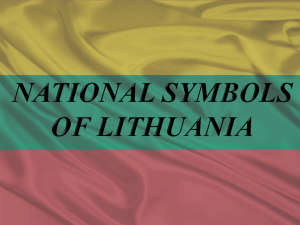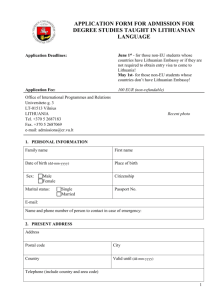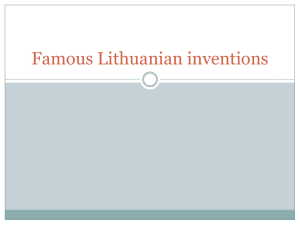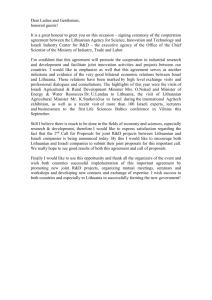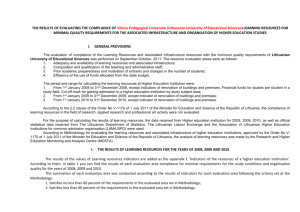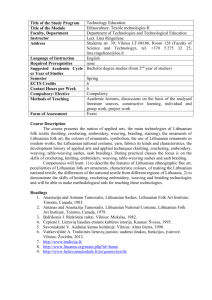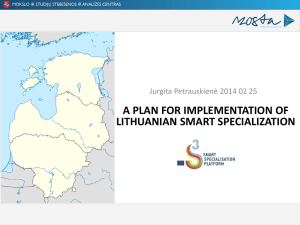Short glossary of Baltic gods and goddesses
advertisement
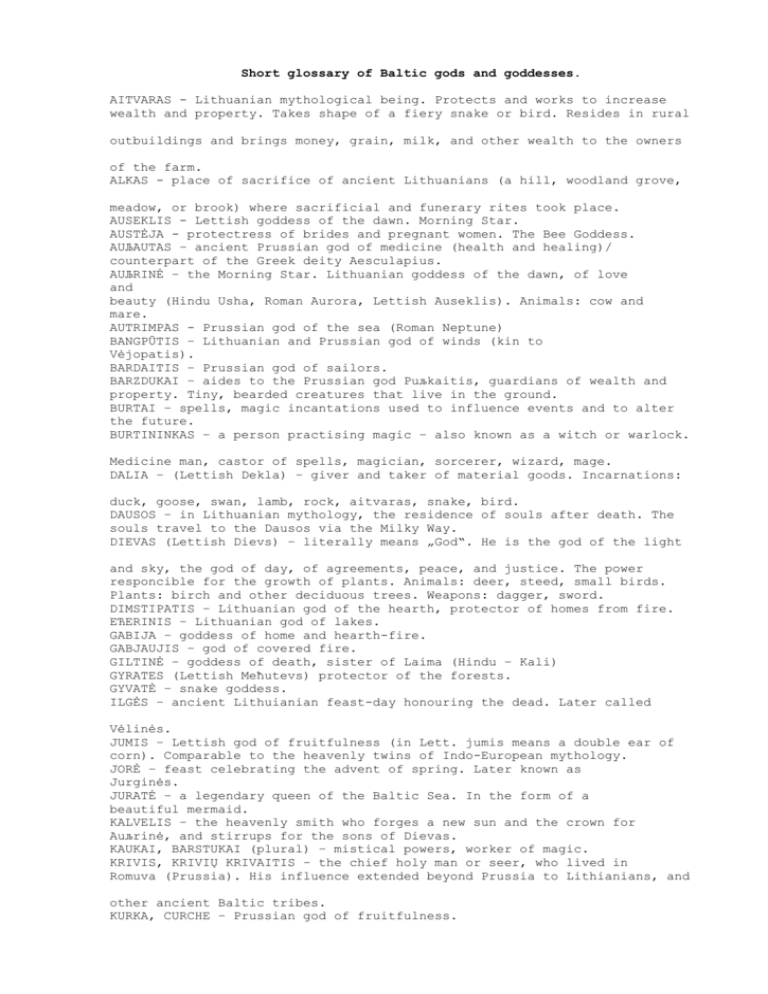
Short glossary of Baltic gods and goddesses. AITVARAS - Lithuanian mythological being. Protects and works to increase wealth and property. Takes shape of a fiery snake or bird. Resides in rural outbuildings and brings money, grain, milk, and other wealth to the owners of the farm. ALKAS - place of sacrifice of ancient Lithuanians (a hill, woodland grove, meadow, or brook) where sacrificial and funerary rites took place. AUSEKLIS - Lettish goddess of the dawn. Morning Star. AUSTĖJA - protectress of brides and pregnant women. The Bee Goddess. AUЉAUTAS – ancient Prussian god of medicine (health and healing)/ counterpart of the Greek deity Aesculapius. AUЉRINĖ – the Morning Star. Lithuanian goddess of the dawn, of love and beauty (Hindu Usha, Roman Aurora, Lettish Auseklis). Animals: cow and mare. AUTRIMPAS - Prussian god of the sea (Roman Neptune) BANGPŪTIS – Lithuanian and Prussian god of winds (kin to Vėjopatis). BARDAITIS – Prussian god of sailors. BARZDUKAI – aides to the Prussian god Puљkaitis, guardians of wealth and property. Tiny, bearded creatures that live in the ground. BURTAI – spells, magic incantations used to influence events and to alter the future. BURTININKAS – a person practising magic – also known as a witch or warlock. Medicine man, castor of spells, magician, sorcerer, wizard, mage. DALIA – (Lettish Dekla) – giver and taker of material goods. Incarnations: duck, goose, swan, lamb, rock, aitvaras, snake, bird. DAUSOS – in Lithuanian mythology, the residence of souls after death. The souls travel to the Dausos via the Milky Way. DIEVAS (Lettish Dievs) – literally means „God“. He is the god of the light and sky, the god of day, of agreements, peace, and justice. The power responcible for the growth of plants. Animals: deer, steed, small birds. Plants: birch and other deciduous trees. Weapons: dagger, sword. DIMSTIPATIS – Lithuanian god of the hearth, protector of homes from fire. EЋERINIS – Lithuanian god of lakes. GABIJA – goddess of home and hearth-fire. GABJAUJIS – god of covered fire. GILTINĖ – goddess of death, sister of Laima (Hindu – Kali) GYRATES (Lettish Meћutevs) protector of the forests. GYVATĖ – snake goddess. ILGĖS – ancient Lithuianian feast-day honouring the dead. Later called Vėlinės. JUMIS – Lettish god of fruitfulness (in Lett. jumis means a double ear of corn). Comparable to the heavenly twins of Indo-European mythology. JORĖ – feast celebrating the advent of spring. Later known as Jurginės. JURATĖ – a legendary queen of the Baltic Sea. In the form of a beautiful mermaid. KALVELIS – the heavenly smith who forges a new sun and the crown for Auљrinė, and stirrups for the sons of Dievas. KAUKAI, BARSTUKAI (plural) – mistical powers, worker of magic. KRIVIS, KRIVIŲ KRIVAITIS – the chief holy man or seer, who lived in Romuva (Prussia). His influence extended beyond Prussia to Lithianians, and other ancient Baltic tribes. KURKA, CURCHE – Prussian god of fruitfulness. LADA – Lithuanian goddess of fruitfullness, marital rekations and martial concord. LAIMA (Lett. Laima) – goddess of destiny, the All-knowing. Incarnations – cuckoo (messenger of destiny and spring), owl, titmouse (messenger of death), she-elk, bear. LAUKPATIS (Lett. Meћu tevs) – protector of domestic animals and farmland. LAUSARGIS – Lithuanian god god and protector of arable land. LAUMĖ (Lett. Zemes sieva) functionary of Laima and Ragana, goddess and woman. Protectress of orphans and lost children. Bestower and taker of wealth and fertility. Harborer of death. LAZDONA – protectress of nuts, nut-trees, and nut groves. LIZDEIKA – the seer who interpreted Prince Gediminas’ dream of the iron wolf. According to the XVI century Lithuanian chronicles, the baby Lizdeika was found in an eagle’ nest – hence the name Lizdeika (lizdas means nest in Lithuanian). He grew up to become the chief seer of Lithuania (Krivių Krivaitis) MARЉA – goddess of birthing calves, protectress of cows. Incarnations – black snake, hen, and black insect. MEDEINA (Lett. Mezu mate) – goddess and protectress of the forests and the hunt. MĖNUO, MĖNULIS – Moon, Lithuanian deity of the Earth and the dead. It is thought that the home of the waning moon was beneath the ground, and that of the young moon – the heavens. In many of the prayers directed to it, the ypng moon is addressed as god and prince, is petitioned to bring health and good fortune. MIЉKINIS, GIRINIS (fr. Lithuanian ”miљkas“, „giria“, meaning „forest“) Lithuanian god of the forests, the spirit of the woodlands. Comparable to the Roman Sylvanus. MORĖ – effigy in the form of a woman, a symbol of winter. It is traditionally burned on Shrove Tuesday, as a symbolic expulsion of winter. NUNADIEVIS – Litjuanian god, found in XIII century writings. The meaning is not quite clear – it is either the chief of gods (No-an-deiv) or a misspelling of Numdievas – god of the house. PAGIRINIS – grass snake that was kept in ancient Lithuanian homes; considered being a god. Its purpose was to protect the hearth-fire from strangers. PATRIMPAS – Prussian god of cornfields, who was supposed to bring victory in war. Imagined to be a young man crowned with a wreath made of ripe ears of grain. His symbol was the grass snake. Some held him to the god of the waters as well. One of the three principal Prussian deities. PATULAS – Prussian god of death and the underworld. The opposite of Patrimpas. Imagined as a horrible old man with a long white beard, head swathed in lengths of whiten linen. He appeared at night. His symbol – the head of a dead man, or horse, or cow. One of the three principal prussian gods. Later reffered to as Pikulas, Poklius. The counterpart of the Lithuanian Velnias. PERGUBRIS – Prussian god of spring and vegetation. He casts out winter and helps the plants to grow. The first spring holiday, Jorė, is dedicated to him. Comparable to the Slavic Jarila. PERKŪNAS (Lettish Perkons) – god of thunder and justice. Impregnates the Earth. Animals: bull, goat. Birds: pigeon, cuckoo. Trees: oak, ash. Weapons: axe, bow, and arrow. PRAAMЋIS, PRAAMЋIUS – the first, all-embracing god of the Baltic Pantheon. Cpuld be very close ralated to Prakorimas or even the same diety by another name. PRAKORIMAS generation He is thought (literally PRUTENIS – – supposed to be one of the Titanic members of the very first of ancient Baltic gods. Ruler of gods and men and their fates. to have had many names, one of which is probably Praamћius „the beginning of eternity”). legendary chief seer (Krivių Krivaitis), brother of the VI century Prussian ruker Videvutis. Supposed to have founded Romuva and the cult of the three main gods – Patulas, Patrimas, Perkūnas. PUЉKAITIS – incarnation of the Earth who engenders the Kaukai. RAGANA – goddess of death and resurection. Protectress of the cycles of nature, keeper of power of life within limits. All knowing, all foretelling. Simultaneously a beautiful and a horrible woman (the modern Lith. word „ragana” means ”witch”). Incarnations: primarily as a toad, but also as a goat, mare, crow, magpie, hedgehog, pike, carp, and other fish. RAMUVA – lithuanian ethno-cultural organisation, founded 1967, banned by the Soviets in 1971. functioned only in the University of Vilnius untill 1988, when it resumed open activity. RASA – ancient Lithuanian feast of summer solstice, resurrected in 1967 in Kernavė by Ramuva movement. ROMUVA – the central sanctuary of the ancient Balts, located in Prussia, founded during the VI century, when the old pagan religion was reformed and the cult of the three principal gods, Patulas, Patrimas, and Perkūnas, established. The re-established ancient Lithuanian pagan religion of today eas officially registered in Vilnius in 1992 under the name of „Romuva“. RUGIŲ BOBA – the Old Crone of the Rye. She ruled the birth, life, and death of cultivated plants. RUPŪЋĖ – Toad; symbol for the energy and regeneration of life. SAMBORIAI – Lithuanian feast occurring in May, celebrating the end of the spring labours and the re-birth of nature. SAULĖ – Sun; wife or daughter of heaven. SIELA – (literally, „soul“) the life force of the body. It leaves the body temporarily during sleep, and forever at the point of death. SKALSA – Lithuanian deity, the embodiment of plenty, prosperity, and good fortune. According to some chroniclers – the Horn of Plenty. A feast in honour of Skalsa used to be celebrated at harvest time. Akin to the Lettish Jumis. SOVIUS – Baltic mythical hero – the founder of the custom of immolation of the dead, guide of the souls of the departed into the afterlife. STABAS – idol; the image of a god. ЉVENTARAGIS – legendary Lithuanian prince, cultural hero. The spot where his corpse was burned was known as the Љventaragis Valley and became the cultural and religious centtre of ancient Lithuania. It is located in Vilnius, between the Vilija (Neris) ir Vilnelė Rivers – the site of present/day Vilnius Cathedral. TULISONYS AND LIGAЉONYS / Prussian seers who officiated at funerary rites. UKAPIRMAS, OKOPIRMAS / chief god of Prussians, corresponding to the Lithuanian Dievas, Latvian Dievs. UNDINĖ – mermaid; mythical being of the sea; a woman with the tail of fish instead of legs. UЋGAVĖNĖS – Shrove Tuesday, celebrated in Lithuania as the symbolic departure of winter. VAIDILA (male), VAIDILUTĖ (female) – Prussian religious officials. Aides to the chief seer, Krivių Krivaitis. They tended the sacred flame and read oracles. VAIЋGANTAS, RŪPINTOJĖLIS - protector of flax and hemp. God of birth, life, tiћorture, death, rebirth. Greek Dionysus. VAKARINĖ – Evening Star. The opposite of Auљrinė. Probably, the planet Venus. VĖJOPATIS – Lithuanian god of wind. VĖLĖ – the soul of a dead person, as opposed to siela / the soul of a living person. When someone dies, the vėlė leaves the body, remaining among the living for a while before it departs for the world of the dead – Dausos, the Hill of Vėlės. VĖLINĖS – Lithuanian feast commemorating the dead (from the word vėlė). Earlier known as Ilgės. VELNIAS, VELAS, VELNS – god of the kingdom of the dead and the netherworld. God of cattle, of magic, and metamorphosis. Creator of black animals and birds. Plants: alder, coniferous trees. Weapons : lance, noose. In modern Lithuanian, the word “velnias” means “devil”. VIDEVUTIS, VAIDEVUTIS – mythologized Prussian cultural hero, brother of Prutanis. Prussians elected him king during the VI century. VILKTAKIS, VILKOLAKIS – (Lettish Vilkacis) – werewolf, a man who has the ability to change into a wolf. ЋALTYS - sacred serpent; a revered grass snake, indiigenous to the Baltic lands. The sentinel of messenger of the ancient Baltic gods plays a significant role in the mythology and lore of the region. It is forbidden to harm or kill one of these creatures. ЋEMĖPATIS, ЋEMININKAS (Lettish Majas Kungs) - Brother of ЋEMYNA, god of inhabited farmsteads, including orchards and gardens, and farms. ЋEMYNA, ЋEMĖ (Lettish Zeme, Zemes mate) – Mother Earth, goddess of fertility and fruitfulness of the Earth. Other of the dead as well as of the living, who gives birth to all. Putiry. Goddess of justice. ЋVAIGЋDIKIS, ЋVAIKЋTIKIS - Prussian god of light. One who produces the necessary light for the groeth of grain, grass, and animals. Equivalent to the Greek-Roman sun gods (ћvaigћdė is modern Lithuanian for „star”). ЋVORŪNĖ, ЋVĖRYNĖ - Lithuanian goddess associated with the Evening Star; holds power over animals, the hunt, and the Earth. Источник: Of Gods & Holidays. Edited by Jonas Trinkunas. Vilnius, 1999.

